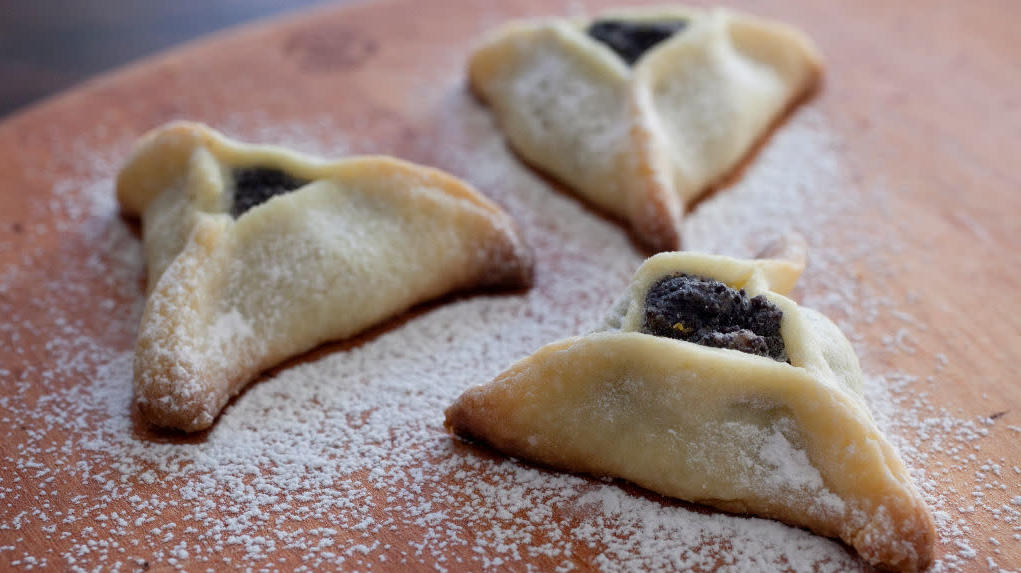Bon Appetit apologizes For Lack Of Sensitivity, Promises More "Archive Repair Efforts"
The Jewish holiday of Purim is coming up in a couple of weeks, which means that it's time for hamantaschen! These triangular cookies, usually stuffed with jam or poppy seeds if you're going super old-school, aren't the only food eaten on Purim, but they're by far the best known. This time of year, Jews are swapping their best hamantaschen recipes and sharing tricks to keep the corners of their hamantaschen from popping open in the oven and leaving circles of dough with puddles of filling in the center. (They still taste good, but they're not as festive.)
Abigail Koffler, a food writer in New York, was researching hamantaschen fillings on the internet the other day and came across an article from 2015 called "How to make Hamantaschen actually good." It was on the website of a prominent food magazine that has spent much of the past year being excoriated for its lack of inclusiveness. Yes, you guessed it, Bon Appetit.
lol i am planning a purim lesson and researching Hamantaschen fillings. One of the top google results: this piece written by a non Jew called "How to Make Hamantaschen actually good." Who published it? I think you can guess: https://t.co/zRc6jqszBg
— Abigail Koffler (@abigailcoughler) February 10, 2021
The writer, Dawn Perry, has one of those names that would make one of my older relatives tilt their head and say, "Doesn't sound Jewish." (Yeah, we do that. Before smartphones, a favorite Jewish parlor game was "Jewish or not Jewish?") Which is not to say that a non-Jew cannot write about Jewish food. Or bake hamantaschen. But it would be courteous to have some expertise, and this article began, "Full disclosure: I am not Jewish. But as someone who attended roughly three Bar or Bat Mitzvahs a weekend during 1992, and as someone who cooks professionally, I thought I could at least weigh in on the Jewish cookie department." Perry promised to create a hamantash that was "untainted by Hebrew School memories."
In its bold attempt to save the Jews from themselves, Perry's article completely ignored the reason why many hamantaschen don't taste "good." Jewish dietary law requires that milk and meat be kept separate, from preparation through digestion. If you drink a glass of milk, say, you have to wait a specified amount of time before eating meat, and vice versa. So if you're preparing a sweet little nosh to eat after your meaty holiday dinner, you absolutely cannot use butter in the preparation. This gives Jewish pastry a, shall we say, unique character, especially if you're kicking it old school with Crisco or vegetable oil instead of one of those newfangled vegan ingredients. One hundred years ago, the crunchiness and lack of taste was a source of pride for some Jews. Nowadays, kosher bakers, armed with regulated ingredients and ovens that hold temperature, have written reliable recipes. (Others of us who don't keep kosher just throw our hands up and say, the hell with it, I'm using butter. Or cream cheese.)
Koffler objected to the lack of explanation, and maybe the implication that hamantaschen are bad because Jews don't know how to bake. And also the assumption that traditional foods needed to be updated. "Especially," she added, "by someone who does not come from that tradition." Others who joined in the Twitter thread objected to the overall tone of the article, which implied that all hamantaschen prior to the advent of this were terrible. (#notallhamantaschen?) They also criticized Perry's suggestion of using an egg wash to glue the corners of the hamantaschen together when the true secret of non-exploding hamantaschen lies in the folding.
But Bon Appetit has learned something from the past year. Within hours of Koffler's original tweet, it posted this:
The edited version of the story includes an apology for the original's "insensitive language" and "flippant tone and stereotypical characterizations of Jewish culture." It also excises all references to Bar Mitzvah partygoing and the description of Queen Esther, heroine of the Purim story, as "a nice Jewish lady." This was all, I have to admit, consistent with the tone of a magazine whose Jewish editor, Adam Rapoport, once suggested frying potato latkes in bacon fat. But Rapoport is gone, and it's a whole new BA.
For some Twitter users, this was enough. But others argued that this points to a larger issue in food writing about who has the "authority" to write a recipe, especially from a culture that they're not very familiar with, and BA's past failures, as detailed in Reply-All's current podcast series "The Test Kitchen," to allow non-white cooks and writers the same opportunities as their white counterparts. Or to acknowledge the skills of non-white cooks, dismissing their recipes by claiming that "you just took your family's recipe." It was impossible to win.
It's going to take time to correct that, not just at BA but in the food world in general. But an apology is a start.
